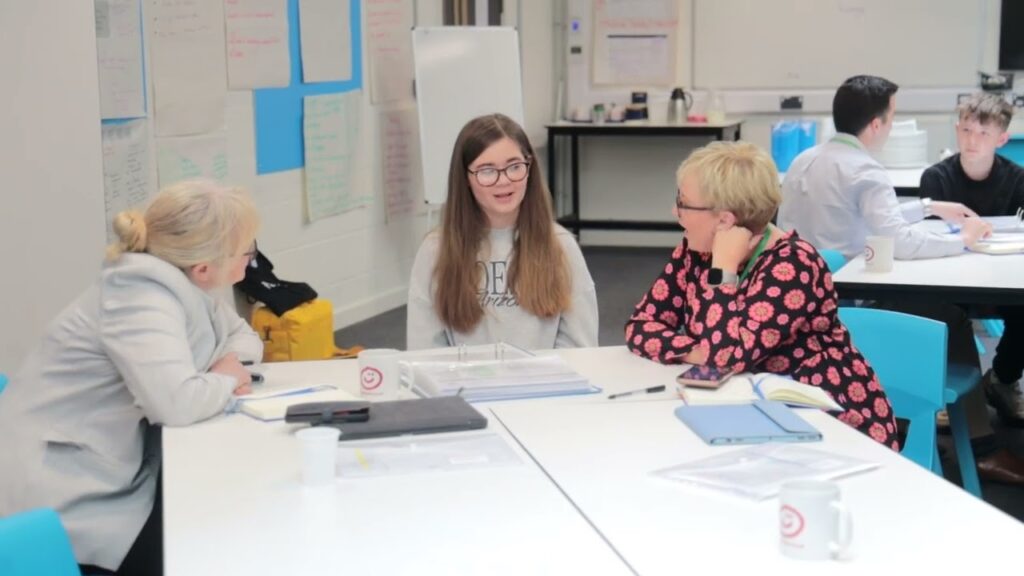Student-led Conferences at XP School Doncaster
Andy Sprakes
This article is about what happens when learners are given space and support to share their learning journey with their family and their teachers. Student-Led Conferences privilege learner voice and agency and are an inspiring alternative to traditional parents’ evenings.
 ‘A thing of beauty is a joy forever.’ John Keats
‘A thing of beauty is a joy forever.’ John Keats
It is ten years since we opened XP School in Doncaster and currently, I’m writing a book that collates some of the highlights of our first decade.
The book is already filled with student work such as field guides, published books, student-scripted films, videos, beautiful artwork and music. At the heart of this work lies student growth and character: every time a student creates work that matters, when it is drafted and redrafted to ensure high quality, when the work connects with the world and has agency, there is something enduring about the impact.
Young people and the world around them are never quite the same after they are published authors, artists who have displayed their work in a public gallery, or poets who have ‘slammed’ in the local Arts Centre.
Young people are never quite the same after hearing and representing the stories of asylum seekers, organising climate conferences, and writing scientific reports that directly tackle the issue of flooding in their district.
This is work that makes a difference to the student who becomes an agent for positive social change and the wider community that benefits from this service.
When you empower young people to do good for the world, they rarely disappoint.
One of the areas that I haven’t written about yet, and I suppose this is a good place to start to gather my thoughts, is how by having high expectations for our young people we empower them still further.
For example, at XP, we do not run conventional parent consultation evenings, where parents arrive, meet a teacher, and are given information about their son or daughter that is determined by the adult. We wanted our kids to lead their own learning, so we introduced Student-Led Conferences, taking the simple but highly effective idea from Expeditionary Learning Schools.
What do Student-Led Conferences look like?
At least once a year across our schools, primary and secondary, students lead a conference expressly for their families and teachers. In these conferences, each student shares their portfolio of work and discusses their progress in terms of their academic learning targets, their developing Habits of Work and Learning (HoWLs) and the products they have created.
Students facilitate their conferences from start to finish.
Student-Led Conferences put students in charge of sharing information about their progress with their families. Students learn to advocate for themselves; they reflect upon and provide evidence for their progress; they are able to be explicit about the support they request going forward from teachers and parents. The structure builds students’ sense of responsibility and accountability for their own learning, as well as intentionally developing their leadership skills and confidence.
Student-Led Conferences also greatly enhance family engagement with learning that takes place at school. The conference structure builds family members’ interest and understanding in what has been happening in school and strengthens relationships between students, family members and staff.
The impact of Student-Led Conferences is profound. To watch and listen to students articulate their learning, their mastery of specific learning targets and places they have struggled, and their sense of who they are through the work they are producing is both humbling and uplifting.
It is a ritual and rite that is transformative, full of joy and beautiful–and as Keats said, the memory lasts forever.
Andy Sprakes is the Principal and Co-Founder of XP School in Doncaster.
Professional Prompts
1. As a parent of a school age child (or imagine that you are) how might you respond to attending a Student-Led Conference at consultation evening? What might you like and not like?
2. In discussion with one or more colleagues, list the points you can think of in favour of Student-Led Conferences and those against. Which side wins?
3. In the Resources for Teachers section of this edition there is a protocol or guide designed to support teachers with Student-Led Conferences. It has been contributed by Randy Scherer from High Tech High in San Diego. Discuss this with other teachers and see if you can find a place to try it out in your school.

